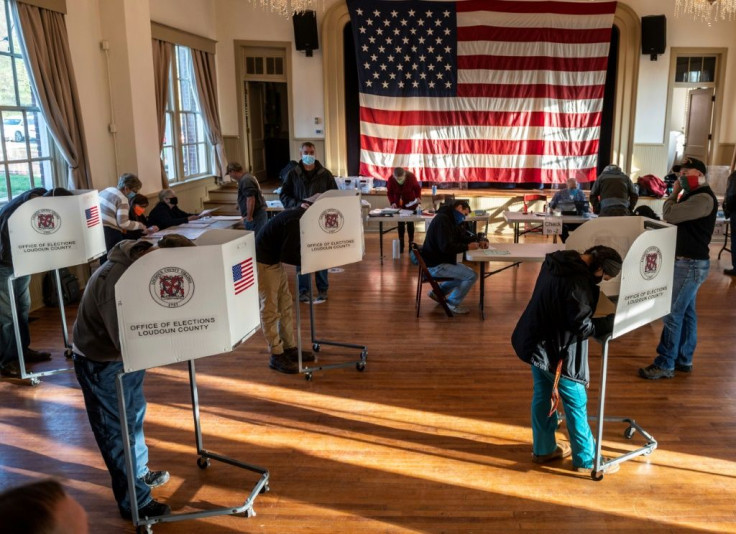Expert Advice to Beat Election Day Stress

Election 2020. It dominates every conversation, is on the front page of every news site, spreads across every social feed, and seeps into almost every ad break. If you’re experiencing stress and anxiety or even losing sleep about the election results, many others can keep you company. We have asked the experts for advice to get you through the big day and beyond.
Gearing Up Your Mind
“Experiencing anxiety and stress due to the election is a normal human response,” Leela Magavi, MD, a psychiatrist and regional medical director at Community Psychiatry in California, told Medical Daily. “Most individuals are already experiencing depressive and anxiety symptoms due to limited social interaction, lack of routine, job loss and various other psychosocial stressors, so the political climate only exacerbates their stress, sadness and worries.”
According to Brittney Morse, a licensed advanced alcohol and drug counselor at American Addiction Centers, defining your own mental state is the key to thriving in these tumultuous times. “The way you perceive a situation really has a significant influence on how you will cope with it. Also, when you let go of things that are outside of your control, it will help you focus on the things you can impact, such as casting your vote.”
For Dr. Magavi, a measure of peace can come from putting pen to paper. “I advise my patients to create lists of things that are in their control and things that are going well, when their anxiety transforms into catastrophizing,” she said. “Writing and journaling can help individuals gain clarity, and music and art can help release emotions in a creative manner.”
Daniel Rifkin, MD, the sleep medicine specialist who developed the sleep apnea app Ognomy, advised literally putting the election away. “Set aside 10 to 15 minutes after dinner to write down your election thoughts, and then put the paper in a drawer,” he suggested. “When your brain turns to the election while in your bed, you can remind yourself that you’ve filed those concerns for another day.”
The Physical Factor
Physical activity is deeply connected to brain function, including managing stress.
For Ms. Morse, exercise is a crucial tool. “I highly recommend people get some form of exercise. It can be as simple as going for a short walk outdoors. Exercise releases natural endorphins that can help you feel better and reduce tension in the body.”
Dr. Magavi also endorsed exercise. “Thirty minutes of exercise each day could help release anger and frustration,” she said. “Mindful walks alone and with loved ones can help individuals refocus their mind on nature and sensations in their body, and divert their attention from worries about politics.”
Even if you don’t have time to step outside, you can regain some control through breathing exercises. “If you find yourself feeling overwhelmed with anxiety or stress in a given moment, take a few minutes to do some deep breathing. Deep breathing can help calm your nerves, slow your heart rate and signal to your body that you are not in immediate danger,” said Ms. Morse.
Dr. Magavi explained, “Deep, diaphragmatic breaths allow individuals’ amygdala, or fear center of the brain, to settle down, so they can feel more grounded, calm and in control during this time of uncertainty.”
Avoid Negative Influences
It’s tempting to go all-in on information overload, but getting too plugged into the election news cycle can affect your sleep. That in turn makes your stress worse, which affects your sleep even more.
Wayne Ross, senior sleep researcher at InsideBedroom.com, recommends detaching from the news cycle early in the evening. “Stay away from digital or connected devices and news channels, debates and talk shows as the evening progresses.”
Turning off electronic devices before bedtime is a common refrain among experts, as is avoiding late-night election conversations with significant others. Dr. Rifkin explained, “It’s best to use your bed for sleep; too much awake time in bed can lead to negative conditioning and can also perpetuate insomnia.”
Finally, don’t try to drink yourself to sleep. Ms. Morse reminded us that alcohol is at best a temporary distraction, and it’s bad for your sleep, too. Mr. Ross specifically recommended limiting alcohol intake on election night, and Dr. Rifkin advised that “[t]oo much alcohol can be dangerous and hinder your sleep.”
The Take Home
Election anxiety is a common problem, and one that is compounded by this year’s COVID-19 pandemic. There’s no way to completely eliminate the stress, but with the right techniques, it can be managed. As Ms. Morse reminded us, “At the end of the day, you need to prepare yourself for any outcome and know that, no matter what happens, you are in control of your reaction."
Sean Marsala is a health writer based in Philadelphia, Pa. Passionate about technology, he can usually be found reading, browsing the internet and exploring virtual worlds.
Published by Medicaldaily.com



























